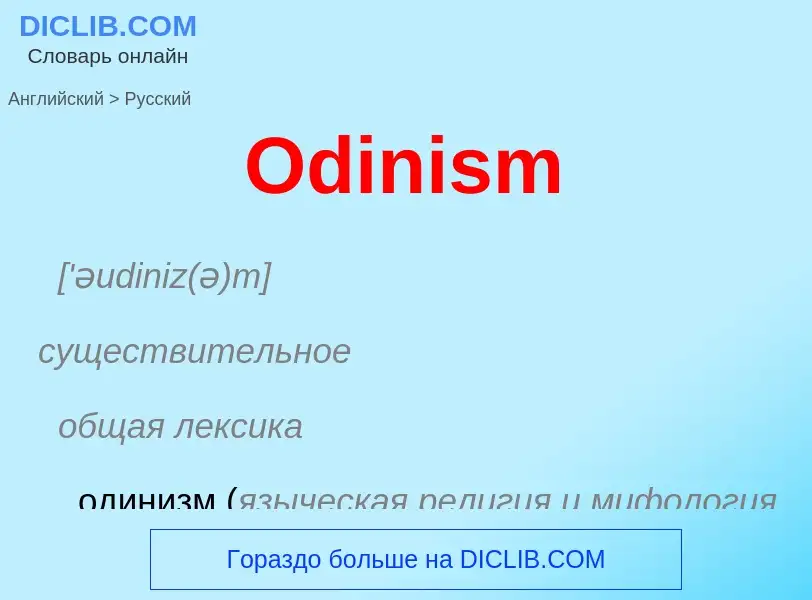Μετάφραση και ανάλυση λέξεων από την τεχνητή νοημοσύνη ChatGPT
Σε αυτήν τη σελίδα μπορείτε να λάβετε μια λεπτομερή ανάλυση μιας λέξης ή μιας φράσης, η οποία δημιουργήθηκε χρησιμοποιώντας το ChatGPT, την καλύτερη τεχνολογία τεχνητής νοημοσύνης μέχρι σήμερα:
- πώς χρησιμοποιείται η λέξη
- συχνότητα χρήσης
- χρησιμοποιείται πιο συχνά στον προφορικό ή γραπτό λόγο
- επιλογές μετάφρασης λέξεων
- παραδείγματα χρήσης (πολλές φράσεις με μετάφραση)
- ετυμολογία
Odinism - translation to ρωσικά
['əudiniz(ə)m]
существительное
общая лексика
одинизм (языческая религия и мифология древних скандинавов)
['əudin]
существительное
мифология
Один
Ορισμός
Βικιπαίδεια
 2010-07-10.jpg?width=120)
Heathenry, also termed Heathenism, contemporary Germanic Paganism, or Germanic Neopaganism, is a modern Pagan religion. Scholars of religious studies classify it as a new religious movement. Developed in Europe during the early 20th century, its practitioners model it on the pre-Christian religions adhered to by the Germanic peoples of the Iron Age and Early Middle Ages. In an attempt to reconstruct these past belief systems, Heathenry uses surviving historical, archaeological, and folkloric evidence as a basis, although approaches to this material vary considerably.
Heathenry does not have a unified theology but is typically polytheistic, centering on a pantheon of deities from pre-Christian Germanic Europe. It adopts cosmological views from these past societies, including an animistic view of the cosmos in which the natural world is imbued with spirits. The religion's deities and spirits are honored in sacrificial rites known as blóts in which food and libations are offered to them. These are often accompanied by symbel, the act of ceremonially toasting the gods with an alcoholic beverage. Some practitioners also engage in rituals designed to induce an altered state of consciousness and visions, most notably seiðr and galdr, with the intent of gaining wisdom and advice from the deities. Many solitary practitioners follow the religion by themselves. Other Heathens assemble in small groups, usually known as kindreds or hearths, to perform their rites outdoors or in specially constructed buildings. Heathen ethical systems emphasize honor, personal integrity, and loyalty, while beliefs about an afterlife vary and are rarely emphasized.
Heathenry's origins lie in the 19th- and early 20th-century Romanticism which glorified the pre-Christian societies of Germanic Europe. Völkisch groups actively venerating the deities of these societies appeared in Germany and Austria during the 1900s and 1910s, although they largely dissolved following Nazi Germany's defeat in World War II. In the 1970s, new Heathen groups established in Europe and North America, developing into formalized organizations. A central division within the Heathen movement emerged surrounding the issue of race. Older groups adopted a racialist attitude—often termed "folkish" within the community—by viewing Heathenry as an ethnic or racial religion with inherent links to a Germanic race. They believe it should be reserved for white people, particularly of northern European descent, and often combine the religion with far right-wing and white supremacist perspectives. A larger proportion of Heathens instead adopt a "universalist" perspective, holding that the religion is open to all, irrespective of ethnic or racial background.
While the term Heathenry is used widely to describe the religion as a whole, many groups prefer different designations, influenced by their regional focus and ideological preferences. Heathens focusing on Scandinavian sources sometimes use Ásatrú, Vanatrú, or Forn Sed; practitioners focusing on Anglo-Saxon traditions use Fyrnsidu or Theodism; those emphasising German traditions use Irminism; and those Heathens who espouse folkish and far-right perspectives tend to favor the terms Odinism, Wotanism, Wodenism, or Odalism. Scholarly estimates put the number of Heathens at no more than 20,000 worldwide, with communities of practitioners active in Europe, the Americas, and Australasia.

 2010-07-10.jpg?width=200)

![A Heathen baby naming ceremony in [[British Columbia]], Canada in 2010 A Heathen baby naming ceremony in [[British Columbia]], Canada in 2010](https://commons.wikimedia.org/wiki/Special:FilePath/Baby naming ceremony, Heathen Freehold Society of British Columbia.jpg?width=200)












![Odin depicted on a monument from about the 9th century in [[Gotland]] Odin depicted on a monument from about the 9th century in [[Gotland]]](https://commons.wikimedia.org/wiki/Special:FilePath/Ardre Odin Sleipnir.jpg?width=200)
![DR BR42]]) featuring a figure above a horse flanked by a bird DR BR42]]) featuring a figure above a horse flanked by a bird](https://commons.wikimedia.org/wiki/Special:FilePath/Bracteate from Funen, Denmark (DR BR42).jpg?width=200)
 sid 103).jpg?width=200)
![Swedish]] Vendel era helmet featuring a figure riding a horse, accompanied by two ravens, holding a spear and shield, and confronted by a serpent Swedish]] Vendel era helmet featuring a figure riding a horse, accompanied by two ravens, holding a spear and shield, and confronted by a serpent](https://commons.wikimedia.org/wiki/Special:FilePath/Del av hjälm vendel vendeltid möjligen oden.jpg?width=200)
![Odin, in his guise as a wanderer, as imagined by [[Georg von Rosen]] (1886) Odin, in his guise as a wanderer, as imagined by [[Georg von Rosen]] (1886)](https://commons.wikimedia.org/wiki/Special:FilePath/Georg von Rosen - Oden som vandringsman, 1886 (Odin, the Wanderer).jpg?width=200)

![Odin's hunt ([[August Malmström]]) Odin's hunt ([[August Malmström]])](https://commons.wikimedia.org/wiki/Special:FilePath/Odin's hunt (Malmström).jpg?width=200)

![A 16th-century depiction of Norse gods by [[Olaus Magnus]]: from left to right, [[Frigg]], Odin, and Thor A 16th-century depiction of Norse gods by [[Olaus Magnus]]: from left to right, [[Frigg]], Odin, and Thor](https://commons.wikimedia.org/wiki/Special:FilePath/Olaus Magnus - On the three Main Gods of the Geats.jpg?width=200)
![italic=no}} says a pagan prayer; illustration (1911) by [[Arthur Rackham]] italic=no}} says a pagan prayer; illustration (1911) by [[Arthur Rackham]]](https://commons.wikimedia.org/wiki/Special:FilePath/Ring48.jpg?width=200)
![''Woðinz'' (read from right to left), a probably authentic attestation of a pre-Viking Age form of Odin, on the [[Strängnäs stone]]. ''Woðinz'' (read from right to left), a probably authentic attestation of a pre-Viking Age form of Odin, on the [[Strängnäs stone]].](https://commons.wikimedia.org/wiki/Special:FilePath/Runic Inscription Sö Fv2011;307.jpg?width=200)
![Stora Hammars I stone]] Stora Hammars I stone]]](https://commons.wikimedia.org/wiki/Special:FilePath/Sacrificial scene on Hammars - Valknut.png?width=200)

 by Konrad Dielitz.jpg?width=200)
.jpg?width=200)

